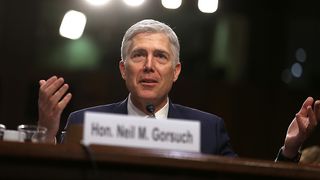The “nuclear option” sounds like a scary solution to the North Korean crisis, but it is the nickname of a parliamentary maneuver the Republican Party is likely to use this week in order to force through President Trump’s nominee for the Supreme Court.
Judge Neil M. Gorsuch would be among the most incisive and conservative of the nine justices on the bench, and that is one reason Democrats oppose him. He has a long record of siding with corporations over workers’ rights, such as the notorious “frozen trucker” case, in which a semi driver whose trailer jammed in winter without heat begged his dispatcher for permission to unhook his load and drive to safety. As his fingers and toes grew numb, he broke the rules to save his life and was promptly fired. When the driver successfully sued, Gorsuch dissented from his fellow judges to argue the firing was legal. Democrats don’t think that’s the kind of juridical interpretation the country needs.
They are even more exercised over how Gorsuch came to be nominated. After Justice Antonin Scalia’s death, President Obama nominated the respected centrist Merrick Garland. The Republican-controlled Senate refused to vote on his appointment or even grant him a hearing. This was an unprecedented blockade that kept the seat open for a year until a Republican president was elected and replaced Garland with his own nominee. Outraged Democrats say quite apart from Gorsuch’s legal skills, he is taking a stolen seat.
Democrats have enough votes to stage a “filibuster” or refusal to end debate. But they do not have enough to prevent Republicans from exercising the “nuclear option” by eliminating the filibuster for Supreme Court nominations.
Confirmation will go from the currently required 60 votes, assuring candidates must be acceptable to some members of the opposition party, to a simple majority of 50 votes, which the Republicans have on their own. With the demise of this tradition in the staid Senate designed to permit the minority party to object to major initiatives or appointments and thereby assure centrist governance, we can expect the body to become even more fractious, and future Trump nominees to be even further to the right.






